Welcome to the free biweekly edition of Storefront Rebellion! This free digest brings Chicago theater news and reviews from me, Kris Vire, right to your inbox. If you’re enjoying it, please tell your friends. Word of mouth is our best advertising. (I borrowed that from a few thousand post-curtain-call speeches.)
I also very much want to hear your feedback: Reply to this email, or if you’re reading this on the web, hit me at kris@krisvire.com or find me on Twitter @krisvire.

How have you been enjoying the Year of Chicago Theatre so far?
Wait, haven’t you heard? 2019 is the Year of Chicago Theatre. Mayor Rahm Emanuel declared it so last September, two weeks after he announced he would decline to run for a third term. And the city held an official kickoff event at the Chicago Cultural Center last Monday to mark the beginning of 2019 as the Year of Chicago Theatre, on the 42nd day of 2019.
But it’s okay, you guys, I already knew it was the Year of Chicago Theatre because I saw that phrase—“2019: Year of Chicago Theatre”—a few weeks ago on an electronic billboard over the Dan Ryan. Unfortunately the billboard changed to a different ad before I could learn more; plus, y’know, I was speeding down the expressway.
The Year of Chicago Theatre, in case you’re somehow not yet up to speed, is the third installment of Rahm’s Chinese zodiac of cultural awareness. It follows 2017, the Year of Public Art, and 2018, the Year of Creative Youth. It’s presumably too early yet to judge the effectiveness of the two prior Years of awareness-raising, but it should be noted that the entire Year of Public Art apparently didn’t raise enough awareness to stop Streets & Sanitation workers from sandblasting legitimate murals across the city last summer.
The official announcement last fall of the YOCT described it as “a citywide, year-long focus on theatre… the first of its kind in the U.S.”
But what does that mean in practice? Like a lot of Emanuel initiatives, it’s mostly marketing to the world outside of Chicago.
As the Tribune’s Chris Jones noted in a column the week of Emanuel’s announcement, the plan includes “promotions planned at the Chicago airports, at the McCormick Place convention center, at Navy Pier and as part of Chicago’s out-of-town tourism campaigns.”
So, those are marketing opportunities targeting visitors to the city at—let’s see—all of Chicago’s major ports of tourist entry. Emanuel’s obsessive need to label Chicago a “world-class city” tends to forget about actually serving our city’s citizens instead of its visitors. But there’s also a long-term pattern of Chicago’s theaters being less than great at marketing themselves to their natural audiences: people who live here.
“Year of Chicago Theatre” banners at O’Hare, Midway and McCormick Place aren’t likely to do much to inform the folks who’ve lived here all their lives, growing up in Chicago neighborhoods like Albany Park or Archer Heights or suburbs like Schaumburg or Tinley Park, without ever hearing much about the hundreds of homegrown theater companies looking to bring new patrons and subscribers through their doors.
The initial announcement in September indicated that $200,000 in direct grants to Chicago theaters would be made available as part of the YOCT. But ahead of the kickoff event last week, it was announced that the city had secured $1 million in grants from local foundations like the Chicago Community Trust, the Driehaus Foundation, and the Illinois Arts Council Agency. With that foundation support, DCASE and the League of Chicago Theatres will now be making $750,000 in direct grants to theaters.
(If my math is right, that means nearly half of that million bucks from the foundations will not be going directly to theaters; let’s hope they’re not blowing it all on digital billboards and banners at Navy Pier.)
The money that is being distributed to theaters will be given “with an emphasis on sector building, increasing diversity and access, and expanding the geographic scope of Chicago theatre, especially on the city’s South and West sides.” These are good and important goals, goals you want to root for (though if you’ve seen Ike Holter’s Red Rex, it might give you some pause).
Yet for all of Emanuel’s vaunted patronage of the arts, his vision of a “world-class city” has tended to favor big-money projects. Emanuel is now actively courting Amazon again, after local opposition in New York led the retailer to call off plans for a new semi-headquarters there.
And yesterday, the city got another step closer to earmarking up to $1.3 billion in public funds for Lincoln Yards, a massive gift to megadeveloper Sterling Bay that, up until a month ago, was set to include a number of new music venues exclusively controlled by monolithic concert promoter Live Nation. The city’s independent music clubs banded together to oppose that part of the deal, leading the Reader to ask last month, “Why won’t City Hall fight for Chicago’s homegrown music scene?”
Which reminded me that when the Tribune made the case, two weeks before the announcement of the Year of Chicago Theatre, that “Emanuel's departure will be a loss to the arts in Chicago,” the only sources who went on the record to agree were Barbara Gaines of Chicago Shakespeare Theater and Roche Schulfer of the Goodman—the only two Chicago theaters whose annual budgets reach eight figures, with long lists of corporate sponsors and large physical facilities in tourist-friendly locations.
When Newcity’s Amanda Finn and Ben Kaye spoke with leaders of smaller companies about the Year of Chicago Theatre earlier this month, the responses were a bit more measured about whether a tourism-focused campaign can trickle down to storefront theater. And one singularly valuable tool for putting a downtown spotlight on neighborhood companies, the DCASE Storefront Theater at Gallery 37, was quietly shuttered under Emanuel’s watch.
As for how the Year of Chicago Theatre is playing out in the media so far? I’ve seen a misguided Forbes.com contributor use the occasion to interview Broadway in Chicago president Lou Raizin about seeing Broadway tours here. (“Did you know that Chicago ranks third (after London and New York) in terms of the vibrancy of its theatre scene?” I did not know that was a thing one could rank!) And then there’s this well-meaning social media editor:
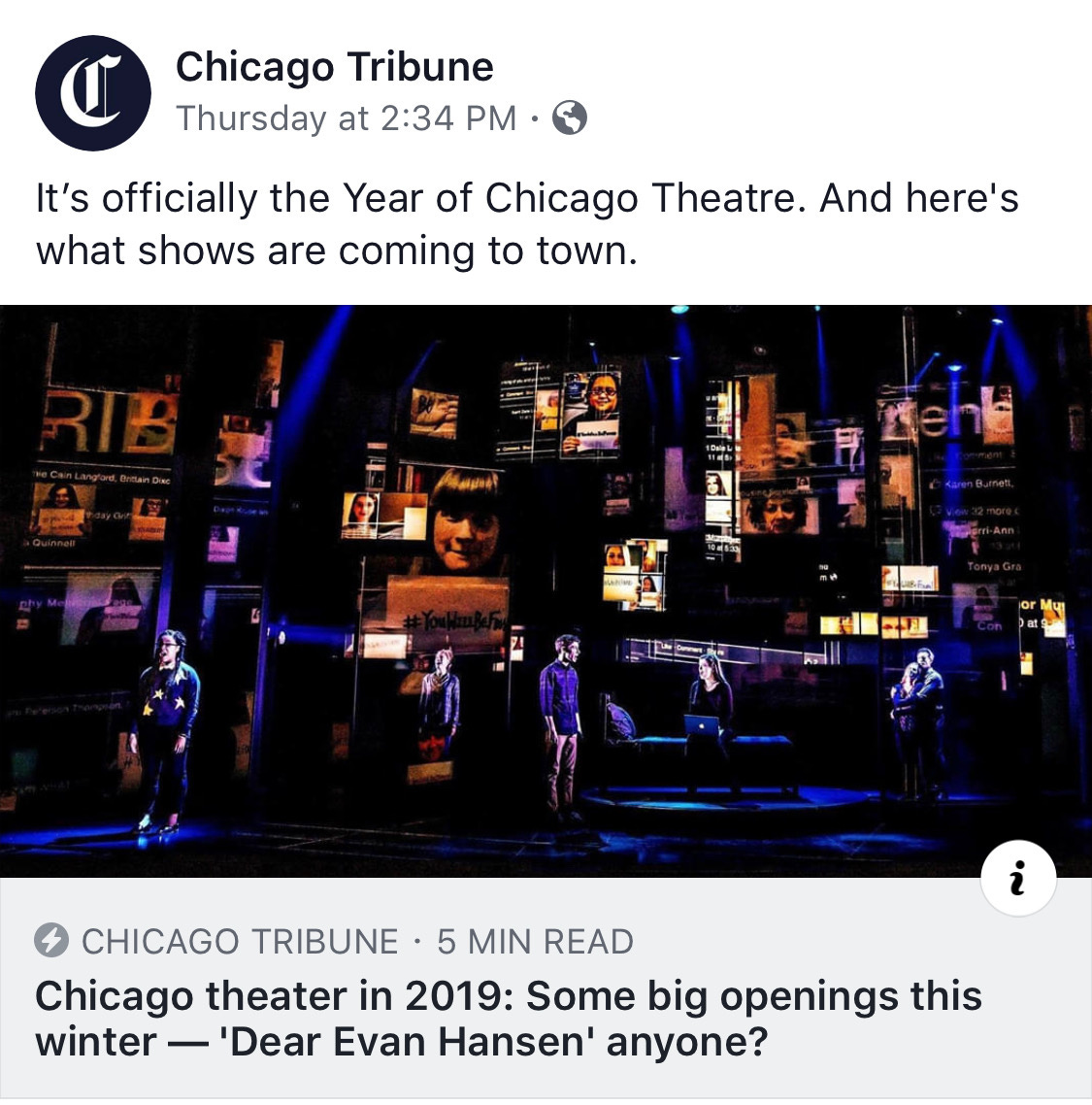
Chicago’s (homegrown) theater scene might be too big and too varied to be captured by any umbrella branding campaign, but I’d love to see a good-faith effort—and one that targets our city’s residents as much or more than visitors. One well-informed visitor, New York Times co-chief theater critic Jesse Green, managed to figure out on his theatergoing trip here last fall that the heart of Chicago theater is in the theaters in its neighborhoods. I hope to see a Year of Chicago Theatre that has its heart in the right place, that place being all 50 wards.
What do you think about the Year of Chicago Theatre so far? I’d love to hear from you.
Reviews and other views
Y’all, it’s been a busy two weeks since the last edition of the digest. I’ve sent six new reviews to Storefront Rebellion paid subscribers, plus written two more for the Sun-Times. (SR subscribers will also be getting my review of First Floor Theater’s Mike Pence Sex Dream shortly.) Let’s get to it:
Victory Gardens stages Dominique Morisseau’s Pipeline:
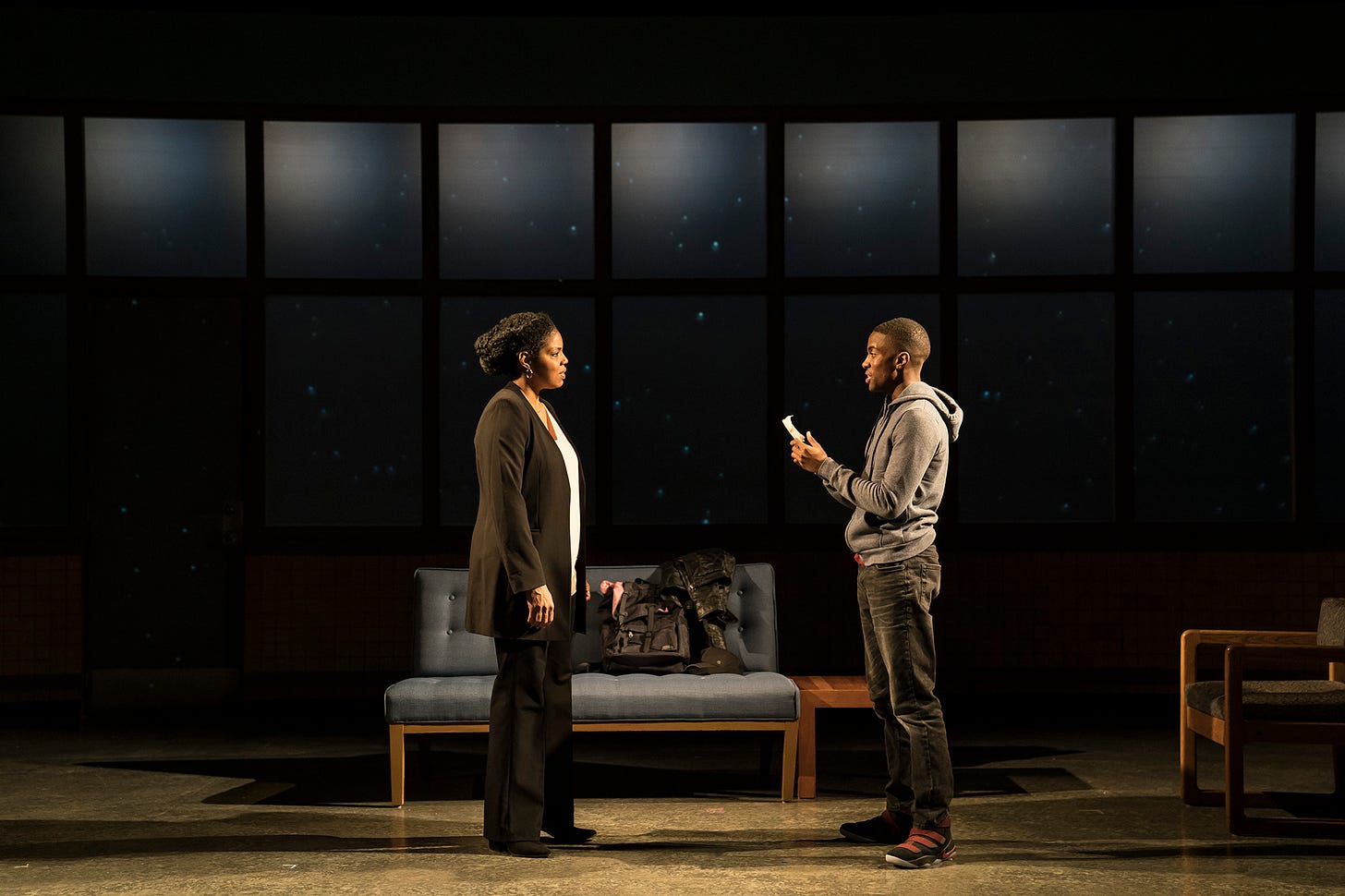
Tyla Abercrumbie and Matthew Elam. Photograph: Liz Lauren
It’s also hard to shake the feeling that Morisseau is showing us aftermath instead of action: We’re always hearing her characters talk about things that happened earlier, offstage. … And there’s a somewhat self-conscious poeticism to the language in places, as if trying to live up to the repeated invocations of [Gwendolyn] Brooks and [Richard] Wright.
A Red Orchid Theatre has the Chicago premiere of Abe Koogler’s Fulfillment Center:

Toya Turner and Jose Nateras. Photograph: Mike Hari
Koogler’s action unfolds in a little under 90 minutes, entirely in two-person scenes: unadorned portraits of four people, each lonely in their own way, flailing and failing to connect.
A Doll’s House, Part 2 is another theatrical thought experiment from Lucas Hnath at Steppenwolf:

Sandra Marquez and Yasen Peyankov. Photograph: Michael Brosilow
It’s neither a straight sequel nor a remix, but instead more of—to borrow a term from Jeff Bezos—a complexifier of Ibsen’s original. It’s less interested in what happened to Nora Helmer, individual and (non-)divorcée, than in what that slamming door means for society at large. This can make the play feel, at least initially, more debate society than drama.
Raven Theatre artistic director Cody Estle stages a worthwhile revival of Paula Vogel’s How I Learned to Drive:
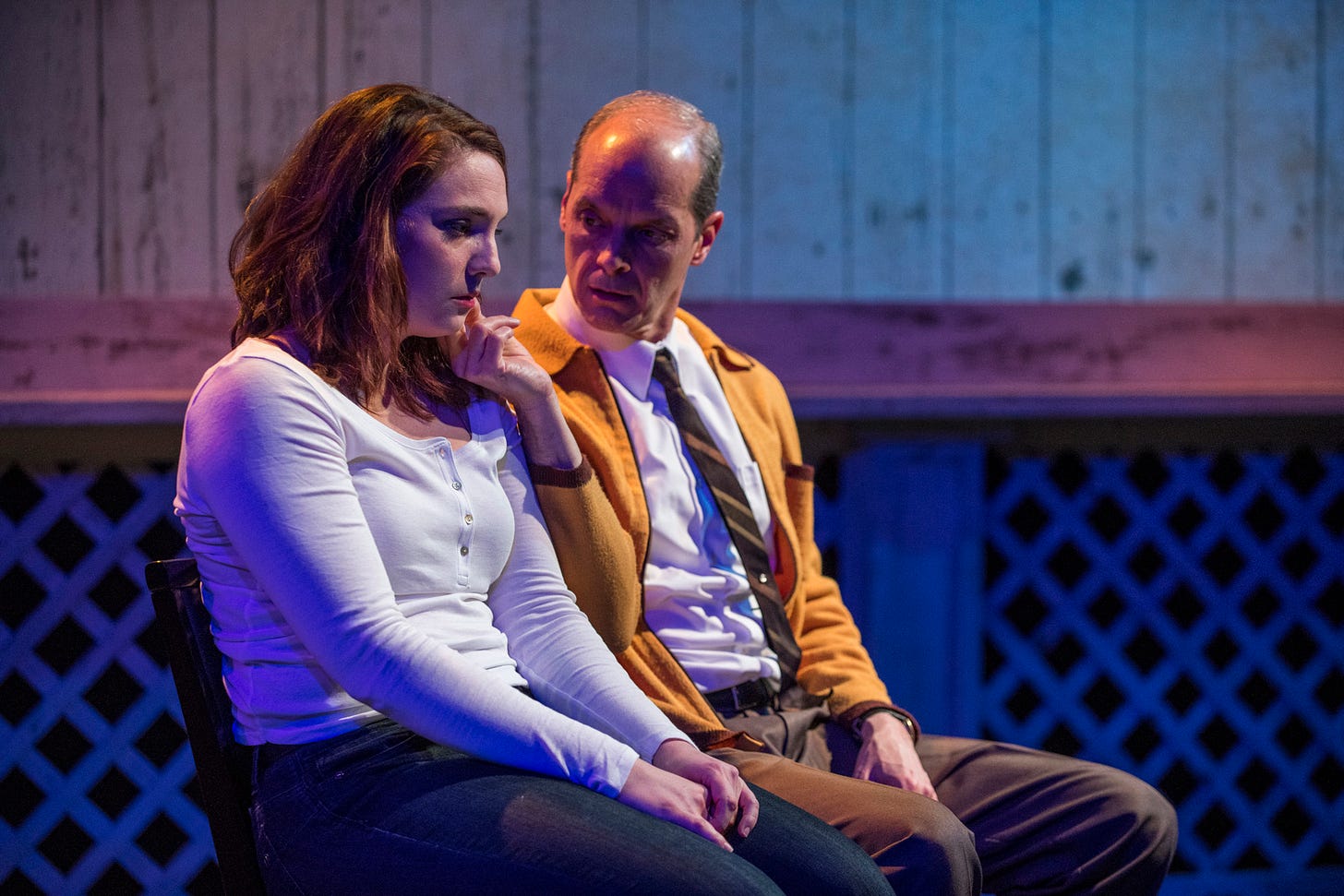
Eliza Stoughton and Mark Ulrich. Photograph: Michael Brosilow
I don’t think Vogel’s greyscale portrait of a particular abusive relationship has ever been easy to watch, no matter how vital it is; part of her striking craft in this piece is the way she endears Peck to us before slowly revealing the beginning and end of his story. But How I Learned to Drive might be a more difficult sell now, despite Estle’s suggestion that it should be part of the #MeToo conversation, than it was when I last saw it during the George W. Bush administration.
Haven Theatre and About Face Theatre’s Chicago premiere of The Total Bent, from the creators of Passing Strange, is the kind of theatrical party you don’t want to miss:

Gilbert Domally, center, and the cast of The Total Bent. Photograph: Austin D. Oie
…dramaturgically it’s kind of a mess; you might find yourself feeling like you’ve missed a scene two or three or four times in the piece’s intermissionless 100 minutes, but you haven’t… But there’s so much in this raucous, subversive jumble of a show that works so well, I’d highly recommend you secure your tickets now and be prepared to just let it wash over you.
And at the newly renamed James M. Nederlander Theatre, Chicago is finally getting its first look at Dear Evan Hansen:
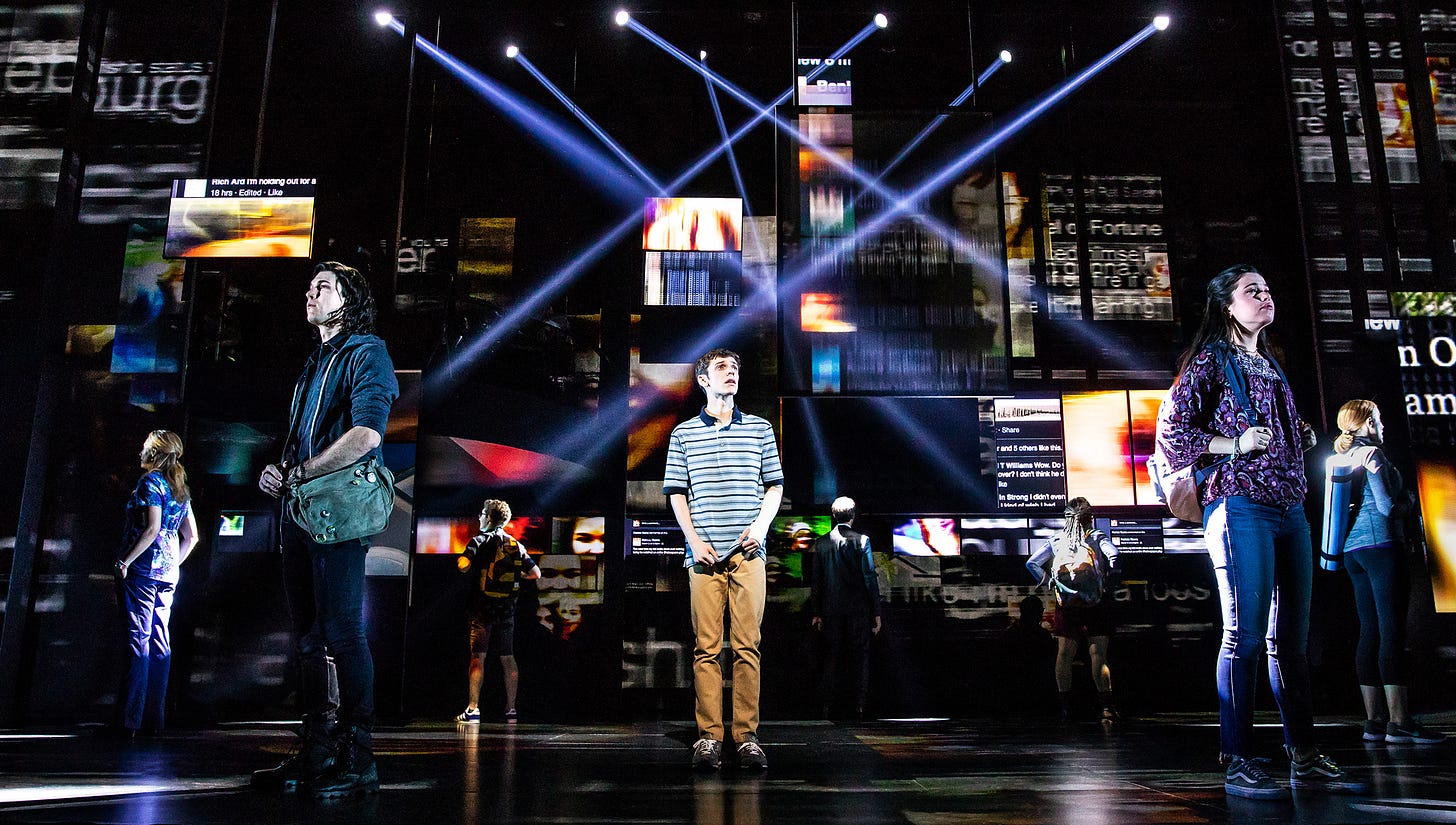
Ben Levi Ross, center, and the first national tour cast of Dear Evan Hansen. Photograph: Matthew Murphy
Dear Evan Hansen is blessed with an extraordinarily emotional and exciting contemporary-pop score by the team of Benj Pasek and Justin Paul, who’ve come quite a long way since I first profiled them seven years ago. That score—which is conducted here on the first national tour by Chicago’s own Austin Cook—also comes with an extraordinary degree of difficulty, particularly for the actor in the title role. Ben Levi Ross, stepping into the big, Tony-winning shoes of Ben Platt, handles Evan’s enormous range—vocally and emotionally—with honeyed voice, solid humor, endearing charm and remarkable vulnerability.
At the Sun-Times, I reviewed Teatro Vista’s world premiere of The Abuelas:
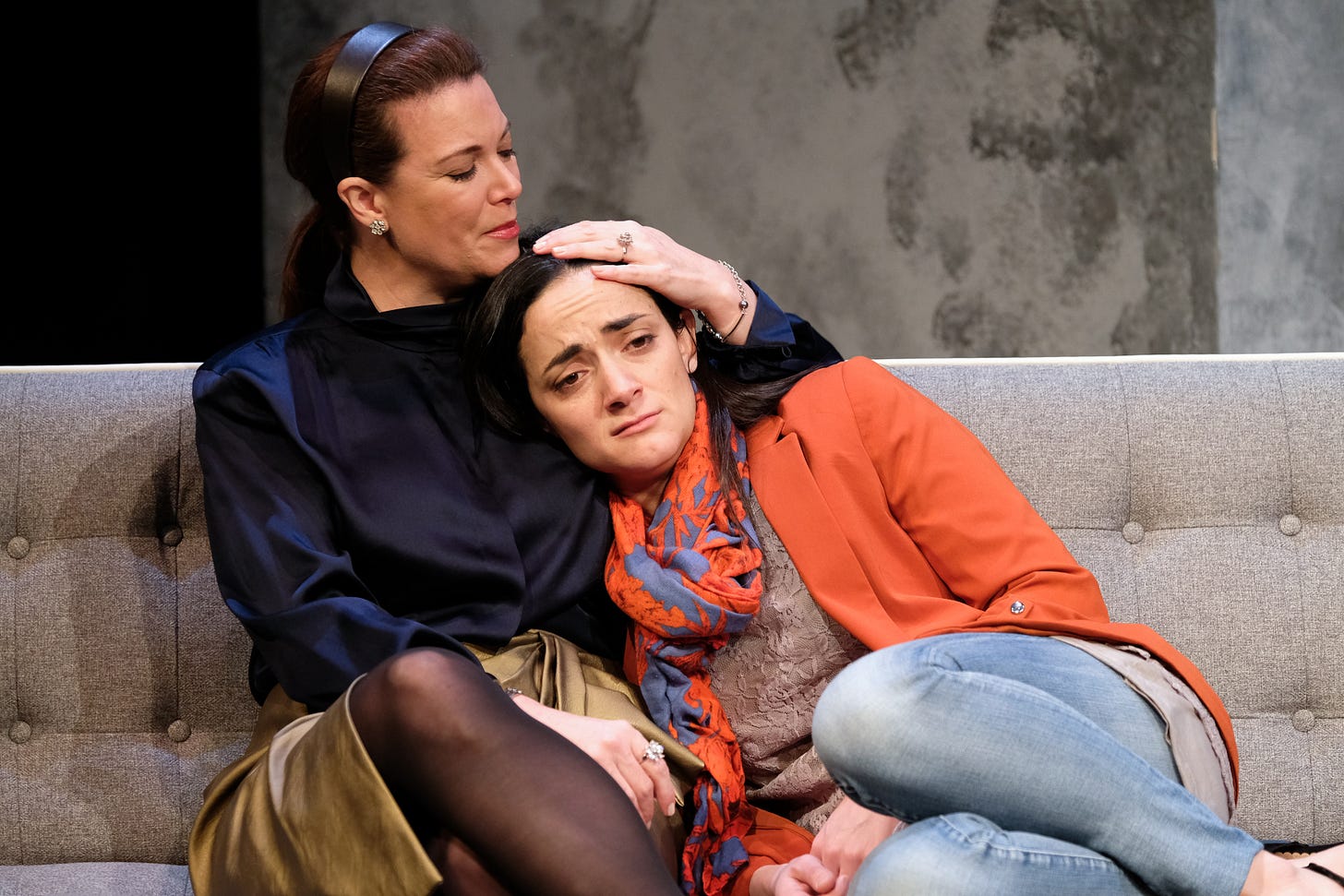
Katie Barberi and Cruz Gonzalez-Cadel. Photograph: Joel Maisonet
The second act, then, becomes entirely about how the various characters react to the previous revelations. There’s valuable stuff to be found there: [Cruz] Gonzalez-Cadel, an actor of extraordinary compassion and warmth, makes the best of the hackneyed situation [playwright Stephanie Alison] Walker places Gabriela in, and that leads to some really moving scenes between Gonzalez-Cadel and [Nate] Santana as their characters do the hard work of marriage.
Also at the Sun-Times, my review of Rebecca Gilman’s Twilight Bowl at the Goodman:
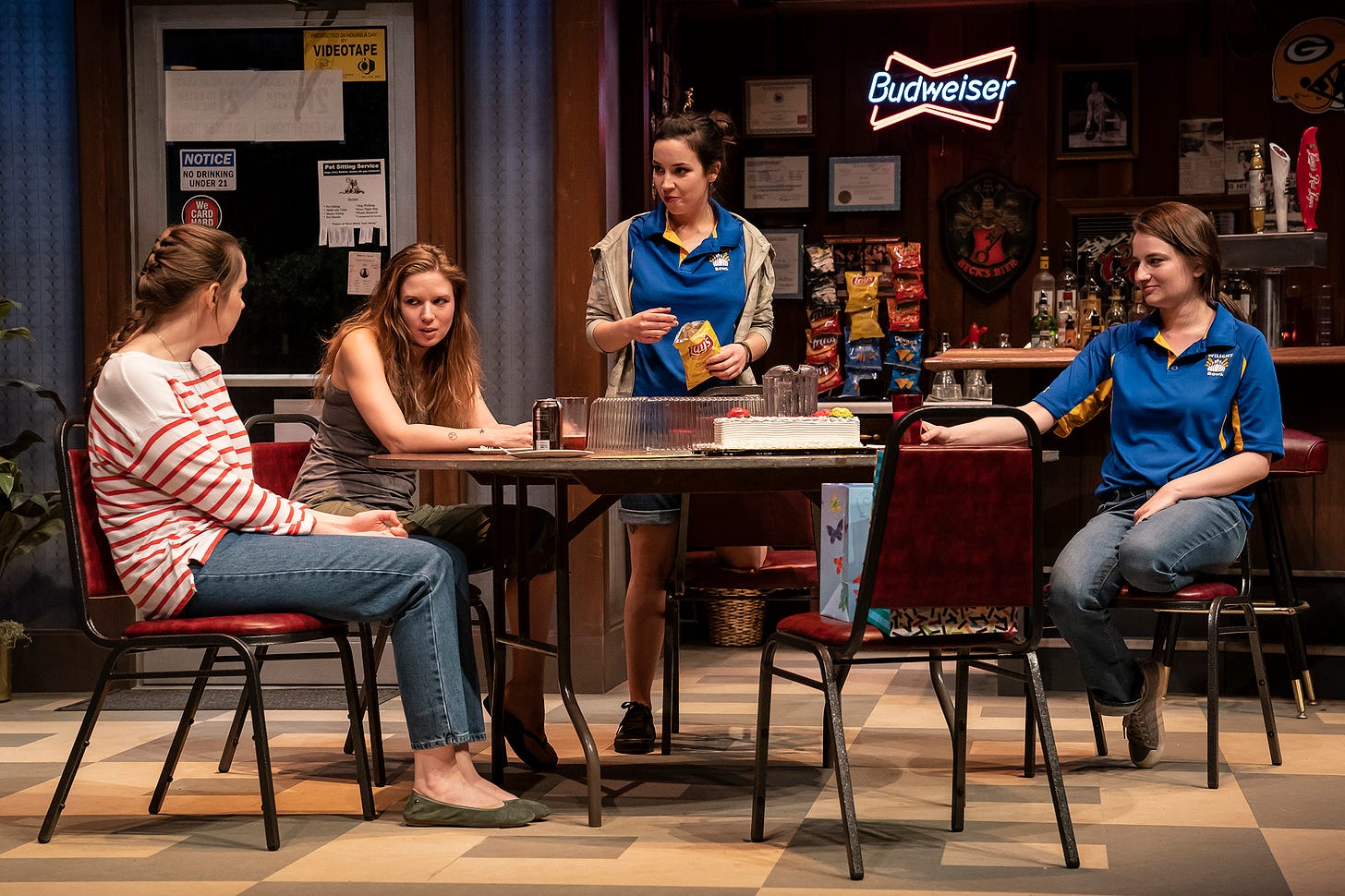
Anne E. Thompson, Heather Chrisler, Hayley Burgess and Becca Savoy. Photograph: Liz Lauren
Like “Soups,” “Twilight Bowl” is a closely observed and authentic-feeling slice of life. Director Erica Weiss’ staging is laced with deep veins of empathy and humor, and the six actors imbue their performances with layers of nuance. Having grown up in and around small towns myself, I felt like I recognized these people and their behaviors.
What to see this week
Nina Simone: Four Women closes March 2 at Northlight, and it’s worth the trip to the ’burbs.

From left: Sydney Charles, Deanna Reed-Foster and Daniel Riley. Photograph: Michael Brosilow
If [Christina] Ham’s script has its shortcomings, though, Northlight’s production is a thrill. Director Kenneth L. Roberson has both a top-tier design team and an incredible cast at his disposal. … Across an unbroken 100 minutes onstage and a dozen or so beloved songs, this is Sydney Charles’s Nina Simone, and it’s more truthful than any paint-and-prosthetics biopic could ever hope to achieve.
Kris recommends
Small Jokes About Monsters at 16th Street Theater, through February 23
The Realistic Joneses at Theater Wit, through March 9
The Total Bent at the Den Theatre, through March 10
Twilight Bowl at the Goodman Theatre, through March 10
Dear Evan Hansen at Nederlander Theare, through March 10
Mike Pence Sex Dream at the Den Theatre, through March 16
Red Rex at Steep Theatre, through March 16
A Gentleman’s Guide to Love and Murder at Porchlight Music Theatre, through March 16
Cardboard Piano at TimeLine Theatre Company, through March 17
A Doll’s House, Part 2 at Steppenwolf Theatre Company, through March 17
The Abuelas at Victory Gardens Theater, through March 17
Fulfillment Center at A Red Orchid Theatre, through March 24
How I Learned to Drive at Raven Theatre, through March 24
Opening soon
May the Road Rise Up at Factory Theater, opens February 22, through March 30
Act(s) of God at Lookingglass Theatre, opens February 22, through April 7
I Wanna Fucking Tear You Apart at Rivendell Theatre, opens February 24, through March 23
The Man Who Was Thursday at Lifeline Theatre, opens February 25, through April 7
Doubt: A Parable, The Gift Theatre at Steppenwolf, February 27–March 31
Southern Comfort, Pride Films & Plays, February 28–March 31
Dutch Masters, Jackalope Theatre, February 25–May 6
Thanks for reading! This is the free biweekly edition of Storefront Rebellion, a newsletter about Chicago theater by Kris Vire. You can subscribe for $6 a month or $60 a year to receive exclusive show reviews and features in your inbox.
Send tips and feedback to kris@krisvire.com, and if you know someone you think would enjoy this newsletter, feel free to forward this to a friend.



